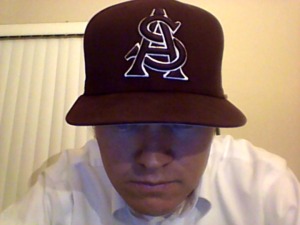I just bought a hat to cover up my progressively widening and elongating forehead.

The thing is though, it took me about a year to finally decide what kind of hat to buy.
See, I have this thing against advertising for stuff on my body: I don’t wear anything that has the brand name prominently displayed; I don’t wear novelty t-shirts; I don’t wear anything with a sports team, or band name; etc. I just don’t like anything enough to wear it around all day, or to try to inspire other people to want to like it to. I think I hate aligning myself with any one particular group, or using my clothing to make arguments about who I am and where I belong.
I think the other thing that I hate about turning myself into a billboard is that inevitably, someone will make a comment about it.
There are two things that freak me out about this prospect. The first is that I will have to have a conversation about it; except it won’t be a conversation, it will be a non-conversation that goes something this:
Some dude: Hey, I saw your shirt. Cool. I’m a big fan of X.
Me: Yeah.
(Ten seconds of awkward silence)
These kinds of interactions turn my guts around. I don’t know what to say, the other person doesn’t know what to say. The entire point of the interaction is to acknowledge that we both have positive feelings toward whatever thing is on my shirt or hat, which is something that I (sorry world) just don’t really care about. I already feel the tiny little marxist angel on my shoulder telling me how terribly consumerist and empty it is for me to be wearing it in the first place, and now I have to openly acknowledge to another person that we both share this dark ugly thing where we define ourselves by material possessions that make reference to other material possessions. Eep.
I can’t stand those conversations. (I think it has something to do with being a blue personality and desiring intimacy above all else. And these conversations are the opposite of intimacy; they are sharing time and space with a person that I will most likely never connect with.)
The second thing, is that I feel like, by wearing the name of something on me, I have to be willing at all times to advocate for that thing, like I’m some prosecutor doing my dangdest to defend that band Y really does make the best music in the world, or brand Z is better than it’s competitor. Or if not that, that I really am a member of whatever group pertains to the thing I am wearing.
When I was a sophomore in high school, my brother bought the latest Method Man cassette Tical 2000: Judgement Day, and, when he left it in the car, I would listen to it, a lot. One day, I went into Hot Topic and found a Johnny Blaze (AKA Method Man) hat on sale, and I liked it, and I had the expendable cash. So I bought it and put it on right away. Ten minutes later I was at Sbarro ordering a slice of cheese pizza, and the guy serving me, a black guy, looked at me with disgust, and said, “What you know about Johnny Blaze?” and then slid me my cardboard pizza slice carrier across the sneeze guard.
I say, “Uh, oh, I uh, I like him,” and feel white and excluded because of my whiteness, probably for the first time.
That moment did something to me that I still wear deep inside. My failure to belong to the group I was advertising for, and the failure to defend my belonging to the group, on top of the shock of being forced to defend my belonging, left a mark on me.
So now it’s really hard for me to buy a hat, even though I am getting balder by the minute.
I finally decided on a baseball cap because it seems the most forgettable to others, and it’s an ASU cap because I didn’t like blank baseball hats, and I go to and teach at ASU, so my belonging there is pretty undeniable.
Sheesh. I think there are people out there that can just buy a hat. How do they do that?

